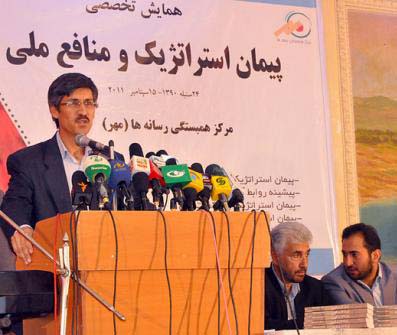KABUL - A long-term US military presence in Afghanistan in the wake of the strategic cooperation pact could perpetuate the war, with increased meddling from neighboring countries, political analysts warned on Thursday. Speaking at a day-long seminar at the Mahr Media Centre in Kabul, analyst Wahid Muzhda said China, Russia and India would not tolerate a long-term presence of US soldiers in Afghanistan.
"After the signing of the strategic cooperation document, then US will set up bases in Afghanistan, which is not acceptable to our neighbors and they will try to fuel instability," Muzhda believed.
The Obama administration knew militants sneaked into to Afghanistan from Pakistan, but it did not prevent their infiltration, he said, adding the US would not stop it even after the accord was inked.
Only "historically defeated" nations would sign accords with the US and allow it to have bases on their soil, remarked a professor of economy at the Kabul University, Saifuddin Saihun. "We are not yet defeated and hence no need for signing the accord."
In addition to other neighbors of Afghanistan, Iran was dead-set against the signing of the agreement, Saihun said, urging the US to focus on strengthening Afghan forces, implementing fundamental reconstruction projects and installing a responsible government in Kabul.
The US had done nothing over the past decade to stabilize the war-crippled country and it would take no such measures in the future, alleged the chairman of the centre, Hussaini Madani. Their 10-year stay showed US soldiers would not respect Afghan laws and tradition even after the pact was signed, he said.
"Also, the Taliban are fighting against the American military presence. If they extend their stay, Afghanistan will face more problems, "Madani said, without elaborating.
Contradictory and inconsistent American statements on the issue were aimed to mislead the Afghans, the professor said, calling the agreement a threat to Afghanistan's sovereignty.
Afghanistan should sign the pact in its own interest, stressed Aziz Ahmed Rehmand, a professor of political science. "Once our neighbors know that the US is in for the long haul, their interference will decrease," Rehmand believed.

